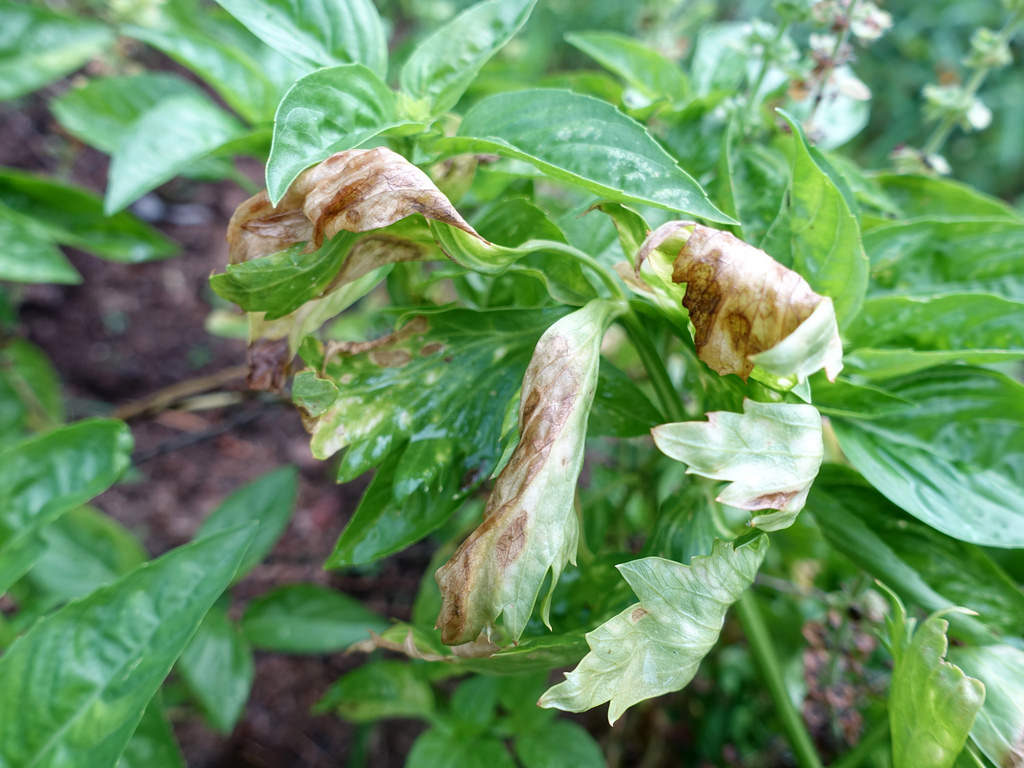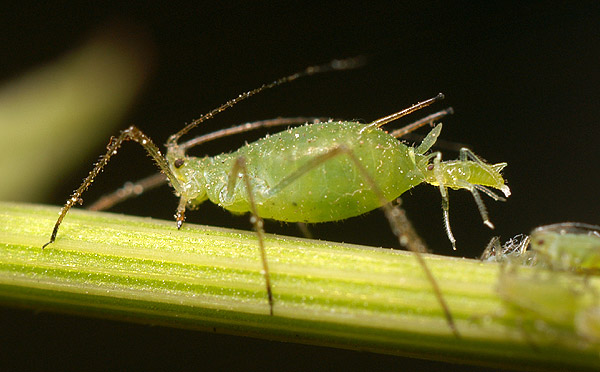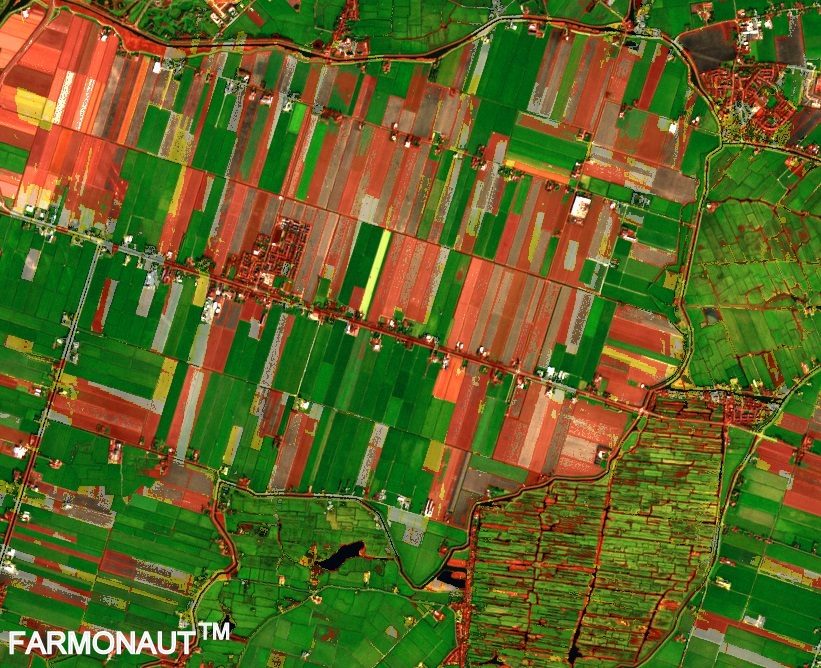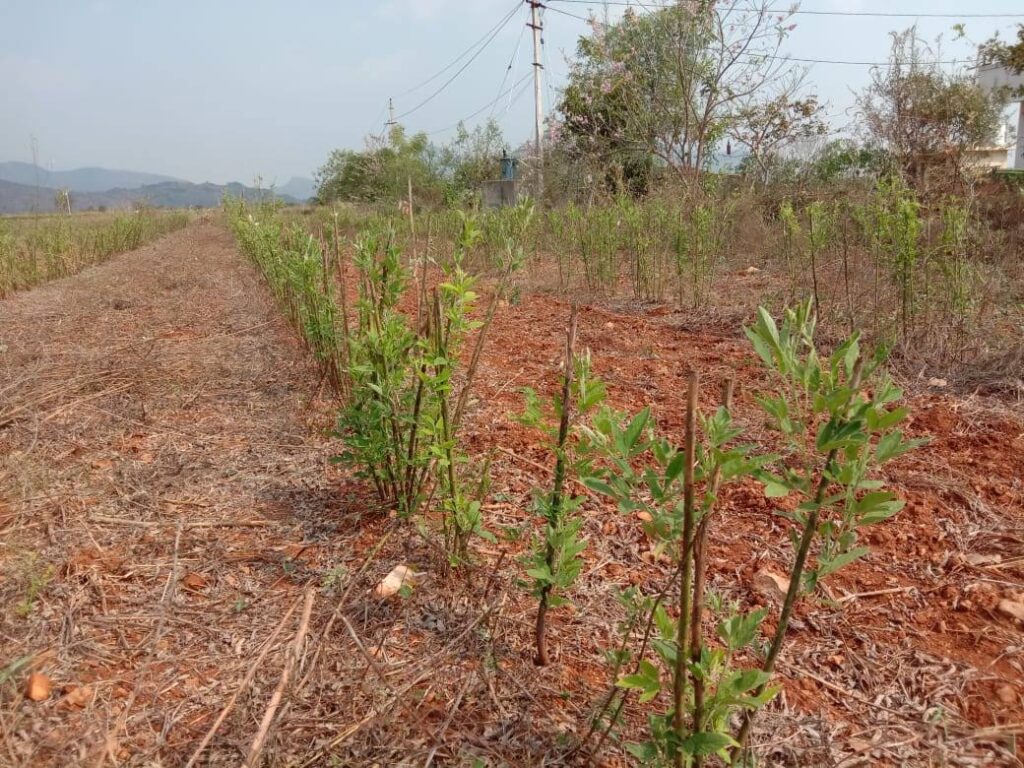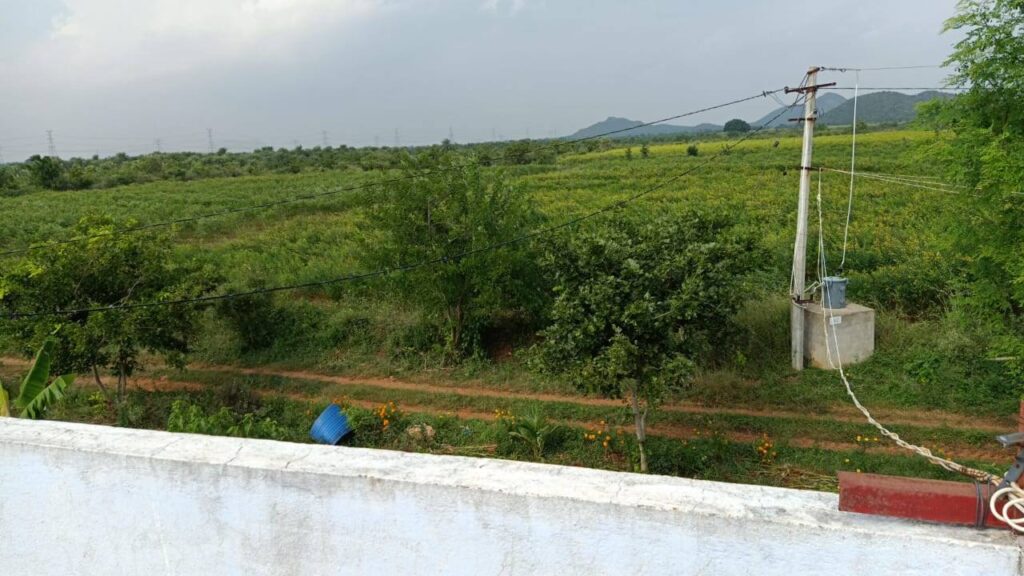Farm Equipment Financing: Leasing vs. Buying – Smart Strategies for Agricultural Producers
“Over 70% of farmers prefer buying equipment outright, despite leasing often being more cost-effective for short-term needs.”
In the ever-evolving world of agriculture, we understand that making informed decisions about farm equipment financing is crucial for the success of agricultural producers. As we delve into the intricacies of farm equipment leasing vs buying, we aim to provide you with comprehensive insights that will help you navigate this complex landscape. Our goal is to equip you with the knowledge needed to make smart choices that align with your farming operations and financial goals.
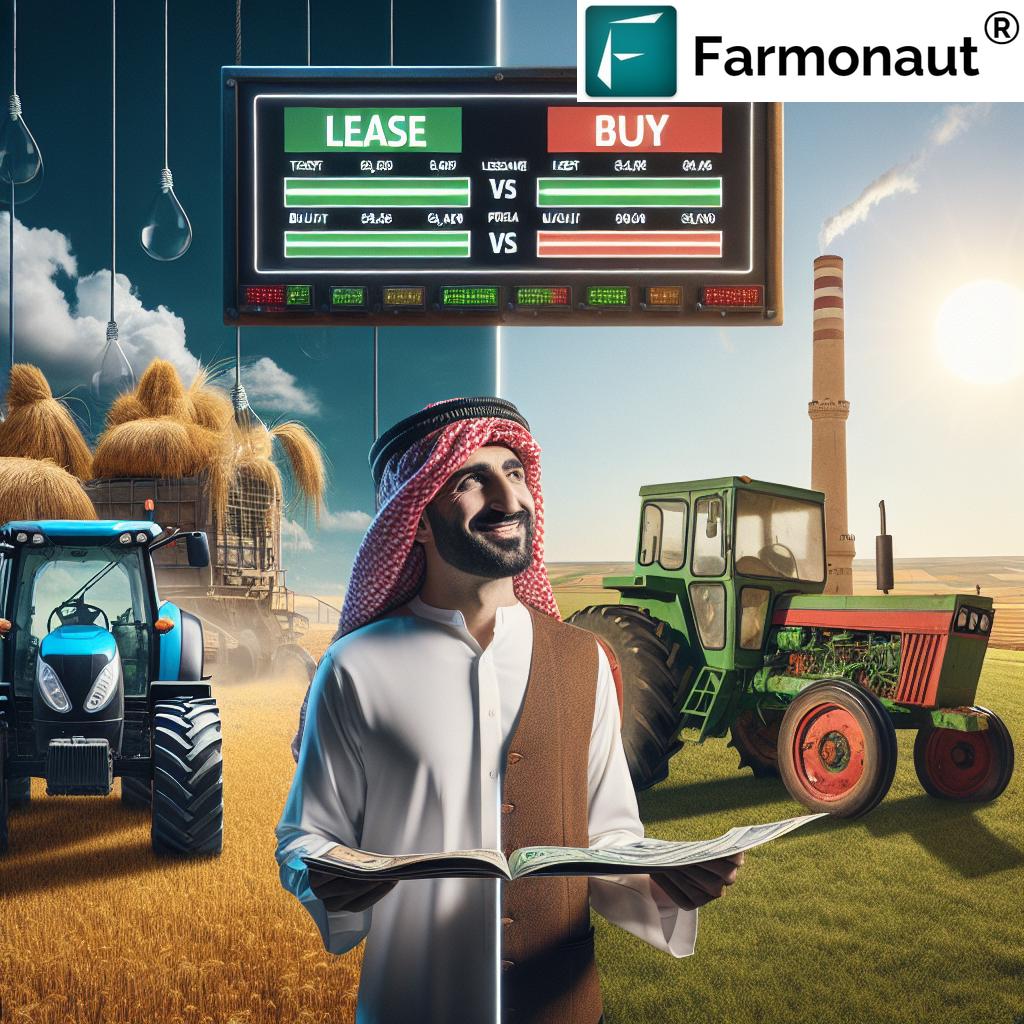
Understanding the Basics: Leasing vs. Buying Farm Equipment
Before we dive deeper into the specifics, let’s establish a clear understanding of what leasing and buying entail in the context of farm equipment:
- Leasing: This option allows farmers to use equipment for a specified period in exchange for regular payments. At the end of the lease term, the equipment is typically returned to the lessor.
- Buying: Purchasing equipment outright, either through cash payment or financing, gives farmers full ownership and control over the machinery.
Both options have their merits, and the choice between them often depends on various factors unique to each farming operation. Let’s explore these factors in detail to help you make an informed decision.
The Benefits of Leasing Farm Equipment
Leasing farm equipment offers several advantages that make it an attractive option for many agricultural producers:
- Lower Initial Capital Outlay: Leasing typically requires less upfront investment compared to purchasing, allowing farmers to conserve capital for other essential aspects of their operations.
- Flexibility: Leasing provides the opportunity to upgrade to newer models more frequently, ensuring access to the latest technology and machinery advancements.
- Reduced Maintenance Costs: Many lease agreements include maintenance packages, shifting the responsibility and cost of upkeep to the lessor.
- Tax Benefits: Lease payments can often be deducted as a business expense, potentially offering tax advantages.
- Improved Cash Flow Management: With predictable monthly payments, leasing can help farmers better manage their cash flow and budget more effectively.
These benefits make leasing particularly attractive for custom operators and farmers looking to preserve investments while maintaining access to modern equipment.
The Advantages of Buying Farm Equipment
While leasing offers flexibility, purchasing farm equipment comes with its own set of benefits:
- Long-term Ownership: Buying equipment means you own the asset outright, which can be valuable for long-term planning and asset building.
- No Usage Restrictions: Owned equipment can be used without the limitations often imposed by lease agreements.
- Potential for Equity Building: As you pay off financed equipment, you build equity in a tangible asset.
- Tax Deductions: Depreciation and interest on financed equipment can often be deducted, offering potential tax benefits.
- Customization Options: Owned equipment can be modified or customized to suit specific farming needs without restrictions.
For farmers with stable, long-term operations, purchasing equipment may align better with their business strategies.
Factors to Consider When Choosing Between Leasing and Buying
To make the best decision for your agricultural operation, consider the following factors:
- Financial Situation: Assess your current capital availability and cash flow projections.
- Equipment Usage: Determine how frequently you’ll use the equipment and for how long you anticipate needing it.
- Technological Advancements: Consider how quickly technology in your required equipment is evolving.
- Tax Implications: Consult with a financial advisor to understand the tax consequences of leasing vs. buying.
- Long-term Business Goals: Align your equipment acquisition strategy with your overall farm business plan.
By carefully evaluating these factors, you can make a more informed decision that supports your farm’s success.
Agricultural Equipment Lease Programs: What You Need to Know
Many financial institutions and equipment manufacturers offer specialized agricultural equipment lease programs designed to meet the unique needs of farmers. These programs often include:
- Flexible lease terms tailored to agricultural seasons
- Options for seasonal payments that align with harvest cycles
- Built-in upgrade paths for transitioning to newer equipment
- Maintenance packages to keep equipment in optimal condition
When exploring lease programs, it’s essential to read the fine print and understand all terms and conditions before committing.
“Leasing farm equipment can save up to 30% in upfront costs compared to purchasing, benefiting cash flow management.”
Tractor Financing: A Closer Look
Tractor financing deserves special attention as tractors are often the backbone of many farming operations. When considering tractor financing options, keep in mind:
- Depreciation Rates: Tractors typically hold their value well, which can influence the decision to buy rather than lease.
- Technology Cycles: High-tech tractors may benefit from leasing if you want to stay current with the latest advancements.
- Usage Patterns: Heavy, consistent use might favor ownership, while sporadic use could make leasing more attractive.
- Maintenance Capabilities: If you have the skills and resources to maintain tractors in-house, ownership might be more cost-effective.
Carefully weigh these factors when deciding whether to lease or buy your next tractor.
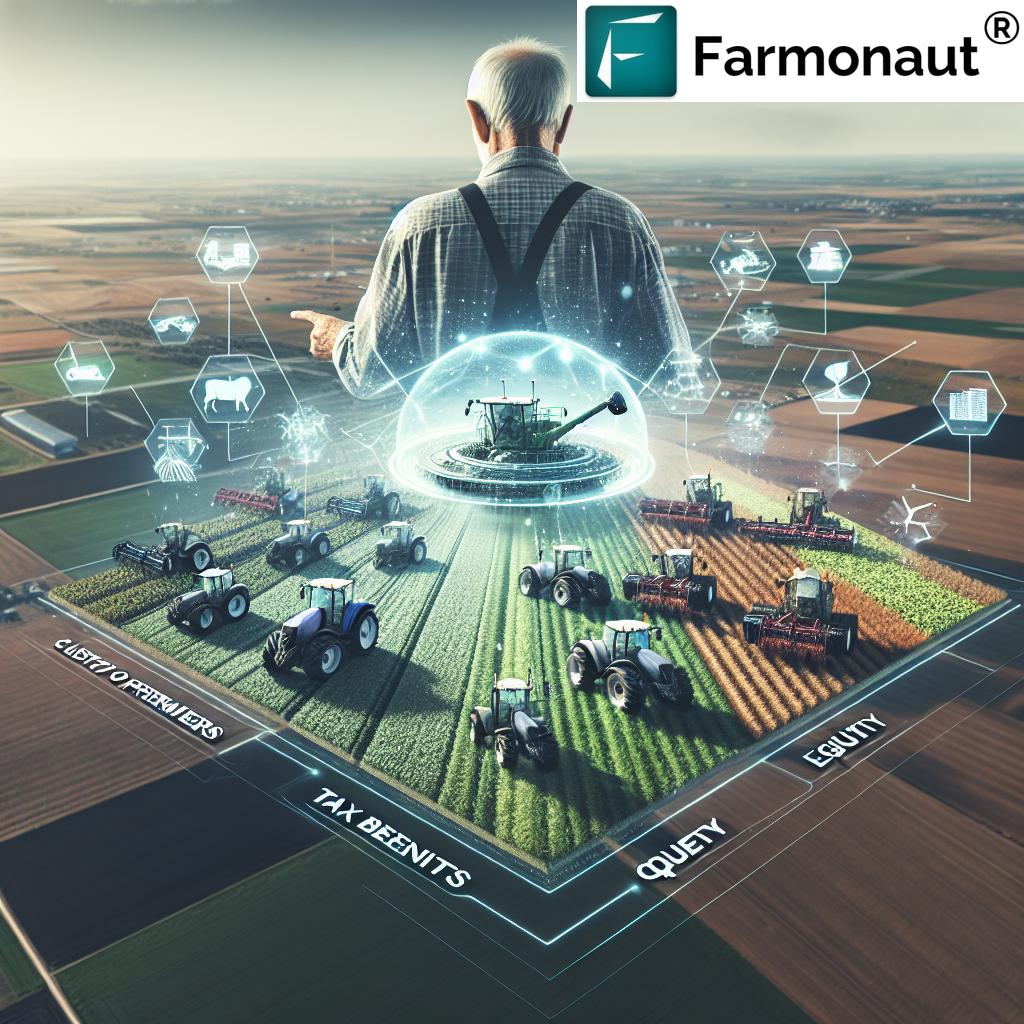
Tillage Equipment and Seeding Machinery: Lease or Buy?
When it comes to tillage equipment and seeding machinery, the decision to lease or buy can significantly impact your farming operations. Consider these points:
- Seasonal Use: These machines are often used intensively for short periods, which might favor leasing for some operations.
- Technological Advancements: Precision agriculture technologies in seeding equipment evolve rapidly, potentially making leasing more attractive.
- Farm Size and Diversity: Larger, more diverse operations might benefit from owning a wider range of equipment.
- Custom Farming Opportunities: Owning tillage and seeding equipment can open up possibilities for custom work, providing additional income streams.
Evaluate your specific needs and long-term plans when deciding on financing options for these crucial pieces of equipment.
The Role of Technology in Farm Equipment Decisions
In today’s digital age, technology plays a crucial role in farm equipment decisions. At Farmonaut, we understand the importance of integrating advanced technologies into farming practices. While we don’t manufacture or sell farm equipment, our satellite-based farm management solutions can help you make more informed decisions about your equipment needs.
Consider how technologies like precision agriculture, GPS guidance, and automated systems factor into your equipment choices. These advancements can significantly impact productivity and efficiency, potentially influencing your decision to lease or buy.
Explore our solutions:
Financial Considerations: Beyond the Lease vs. Buy Decision
When evaluating farm equipment financing options, it’s crucial to look beyond the initial lease vs. buy decision. Consider these financial aspects:
- Total Cost of Ownership: Calculate the long-term costs, including maintenance, repairs, and potential resale value.
- Opportunity Cost: Assess how tying up capital in equipment purchases might affect other investment opportunities.
- Financing Terms: Compare interest rates, down payments, and term lengths for both leasing and buying options.
- Tax Implications: Understand how different financing choices will impact your farm’s tax situation.
For a deeper dive into financial analysis, consider consulting with an agricultural financial advisor or using our API to integrate real-time data into your decision-making process.
Custom Operators: Special Considerations
Custom operators face unique challenges when it comes to equipment financing. The nature of their work often requires access to the latest machinery without the burden of long-term ownership. Here are some key points for custom operators to consider:
- Equipment Utilization: Higher utilization rates might justify ownership, while sporadic use could favor leasing.
- Client Demands: The need to meet varied client requirements might necessitate a more flexible equipment strategy.
- Seasonal Fluctuations: Leasing can help manage the financial impact of seasonal work patterns.
- Technology Upgrades: Leasing allows for more frequent upgrades to stay competitive in the custom farming market.
Custom operators should carefully weigh these factors to develop an equipment strategy that supports their unique business model.
Preserving Investments: Balancing Equipment Needs with Financial Health
For many farmers, preserving investments is a key consideration when making equipment decisions. Here are some strategies to balance equipment needs with overall financial health:
- Prioritize Essential Equipment: Focus on acquiring (whether through lease or purchase) equipment that is critical to your core operations.
- Consider Used Equipment: For less frequently used machinery, purchasing quality used equipment can be a cost-effective solution.
- Explore Collaborative Ownership: Partnering with neighboring farms to share equipment costs can be an effective way to access necessary machinery while preserving capital.
- Leverage Technology: Utilize farm management tools like Farmonaut to optimize equipment use and inform acquisition decisions. Check out our API Developer Docs for integration options.
- Maintain a Reserve Fund: Set aside funds for unexpected equipment needs or opportunities, providing flexibility in your equipment strategy.
By carefully considering these strategies, you can develop an equipment plan that supports your farm’s growth while maintaining financial stability.
Comparing Farm Equipment Financing Options
To help you visualize the differences between leasing and buying farm equipment, we’ve created a comprehensive comparison table:
| Factors | Leasing | Buying |
|---|---|---|
| Initial Capital Outlay | Lower, typically 10-20% of equipment value | Higher, full purchase price or significant down payment |
| Flexibility for Upgrades | High, easier to upgrade at end of lease term | Lower, requires selling or trading in owned equipment |
| Ownership at Term End | No ownership unless lease-to-own option exercised | Full ownership |
| Tax Benefits | Lease payments may be fully deductible as operating expenses | Depreciation and interest on loans may be deductible |
| Maintenance Responsibility | Often included in lease agreement | Owner’s responsibility |
| Impact on Credit Line | Generally less impact, preserving credit for other needs | May tie up significant credit, potentially limiting other borrowing |
| Equipment Obsolescence Risk | Lower, easier to upgrade to newer technology | Higher, owner bears risk of equipment becoming outdated |
| Long-term Cost (5-year estimate) | Potentially higher if continually leasing | Potentially lower, especially if equipment has good resale value |
| Suitability for Custom Operators | Often preferred for flexibility and latest technology access | May be suitable for consistently used, core equipment |
| Effect on Balance Sheet | Off-balance sheet financing in many cases | Equipment appears as an asset, loans as liabilities |
This table provides a quick reference to help you weigh the pros and cons of each option based on your specific circumstances.
Farmstead Projects and Equipment Decisions
When planning farmstead projects, equipment decisions play a crucial role. Whether you’re expanding storage facilities, upgrading processing areas, or improving livestock handling systems, the choice between leasing and buying equipment can significantly impact project outcomes. Consider these points:
- Project Duration: For short-term projects, leasing specialized equipment might be more cost-effective.
- Future Utility: If the equipment will have ongoing use beyond the project, purchasing might be a better long-term investment.
- Budget Constraints: Leasing can help manage cash flow during large-scale farmstead improvements.
- Equipment Versatility: Consider how equipment might be repurposed for other farm tasks after the project’s completion.
By carefully evaluating these factors, you can make equipment decisions that support both your immediate project needs and long-term farm goals.
The Impact of Farm Equipment Decisions on Sustainability
In today’s agricultural landscape, sustainability is a key consideration. Your equipment choices can significantly impact your farm’s environmental footprint and long-term sustainability. Here’s how leasing and buying decisions can affect sustainability:
- Energy Efficiency: Newer equipment often comes with improved fuel efficiency and reduced emissions. Leasing can provide easier access to these eco-friendly options.
- Resource Optimization: Advanced equipment with precision agriculture capabilities can help optimize resource use, reducing waste and environmental impact.
- Maintenance and Longevity: Owned equipment might be better maintained and used for longer periods, potentially reducing the environmental cost of manufacturing new machinery.
- Adaptability to Sustainable Practices: The flexibility of leasing allows farmers to more easily adopt equipment suited for sustainable farming practices as they evolve.
Consider how your equipment financing decisions align with your sustainability goals and the growing demand for environmentally responsible farming practices.
Leveraging Technology for Informed Equipment Decisions
At Farmonaut, we believe in the power of technology to enhance farm management decisions, including those related to equipment. While we don’t directly deal with farm machinery, our satellite-based solutions can provide valuable insights to inform your equipment strategy:
- Crop Health Monitoring: Our satellite imagery can help you assess crop health and yield potential, informing decisions about equipment capacity needs.
- Field Performance Analysis: By analyzing field performance data, you can determine if your current equipment is meeting your farm’s needs or if upgrades are necessary.
- Resource Management: Our tools can help optimize resource use, potentially influencing decisions about equipment efficiency and capabilities.
Explore how our technology can support your farm equipment decisions:
FAQ: Farm Equipment Financing
Q: What are the main differences between leasing and buying farm equipment?
A: Leasing typically requires less upfront capital and offers more flexibility for upgrades, while buying provides long-term ownership and potential tax benefits through depreciation.
Q: How does equipment financing affect my farm’s cash flow?
A: Leasing often results in lower monthly payments, potentially improving short-term cash flow. Buying may require larger initial outlays but can be more cost-effective in the long run.
Q: Can I customize leased equipment for my specific farming needs?
A: Customization options for leased equipment are often limited. If you require significant customization, purchasing might be a better option.
Q: How do I determine if I should lease or buy a tractor?
A: Consider factors such as your farm’s financial situation, how long you plan to use the tractor, the pace of technological advancements in tractor design, and your maintenance capabilities.
Q: Are there tax advantages to leasing or buying farm equipment?
A: Both options offer potential tax benefits. Lease payments may be deductible as operating expenses, while owned equipment can be depreciated. Consult a tax professional for advice specific to your situation.
Conclusion: Making the Right Choice for Your Farm
As we’ve explored throughout this article, the decision to lease or buy farm equipment is complex and depends on various factors unique to each agricultural operation. By carefully considering your financial situation, operational needs, and long-term goals, you can make informed choices that support your farm’s success and sustainability.
Remember, there’s no one-size-fits-all solution. What works best for one farm may not be ideal for another. We encourage you to use the insights provided here as a starting point for your decision-making process. Consult with financial advisors, equipment dealers, and fellow farmers to gain additional perspectives.
At Farmonaut, while we don’t directly handle equipment financing or sales, we’re committed to providing tools and insights that can help you optimize your farming operations. Our satellite-based farm management solutions can provide valuable data to inform your equipment decisions and overall farm management strategy.
We invite you to explore how our technology can support your farm’s success:
Whether you choose to lease or buy your farm equipment, the key is to make decisions that align with your farm’s unique needs and goals. By staying informed, leveraging technology, and carefully evaluating your options, you can develop an equipment strategy that drives your farm’s productivity, profitability, and sustainability for years to come.







